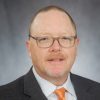James Lewis, MD, FACS (MEHP ’21), says that he wasn’t necessarily looking for a career in education, but that education found him.
Lewis, chief of surgical oncology for the University of Tennessee (UT) Graduate School of Medicine in Knoxville, and medical director of surgical oncology at the UT Medical Center, says that when he joined UT in 2008, he enjoyed working as a surgeon and interacting with residents. Then, a couple of forces propelled him further into education. He had a young daughter with Down syndrome who reframed his ideas about learning and teaching, and he was called out and embarrassed by a program director during a conference on morbidity and mortality.
“I decided the best way to get better is to go take the bull by the horns,” Lewis says. He went to the director’s office and asked how he could improve. The next thing he knew, he was put in charge of grand rounds lectures, and soon after became associate program director.
From there, Lewis kept honing his skills. He took a “Surgeons as Educators” course offered by the American College of Surgeons, and then found Johns Hopkins while researching MEHP degrees. He liked that he could pursue the degree part-time around working hours but initially was concerned about remote learning.
“I had strong fears that there was going to be no emotional connection with the students,” Lewis says. “I was totally shocked about how genuine folks were. These are all people who are in health professions and looking to better themselves…For me, it was a great fit, and it was very satisfying.”
Since completing his MEHP degree, Lewis—a self-proclaimed lifelong learner—has remained involved with the program as a capstone instructor and faculty adviser.
“The projects that come out of the capstones are pretty amazing, and it’s an opportunity for me not to be a captain of a ship but to really learn,” he says. His own thesis studied emotional intelligence and burnout in teaching, and Lewis says he now gravitates to similar themes, working with MEHP fellows investigating topics such as imposter syndrome and microaggressions.
One of his top pieces of advice for learners in the health professions is to strive to be the best they can but to give up the perfectionism that for many physicians has been entrenched even before they start medical school. Lewis, who has been named head of faculty development and wellness for his department, stresses that learners do their best within a safe environment.
“I try to be open-minded and to meet folks where they’re at,” he says. “I believe in constructivism and shared experiences and that with learners—no matter what their level—I can learn from them, and we can work together.”
In 2018, while going through the MEHP program, Lewis was elected an associate member of the American College of Surgeons’ Academy of Master Surgeon Educators. The group is dedicated to fostering the exchange of creative ideas and advancing the science of surgical education, training, and scholarship. He recently reapplied for a second term and plans to engage more with the group now that his MEHP coursework is complete.
Lewis hopes to bring his experience to the Academy of Master Surgeon Educators platform and develop opportunities to improve health care professional wellness and learning, while continuing his adventures with the MEHP community. “Learning is life’s greatest adventure, but without teaching and passing it forward, those experiences are lost on individuals,” Lewis says. “Teaching is an expression of gratitude.”

